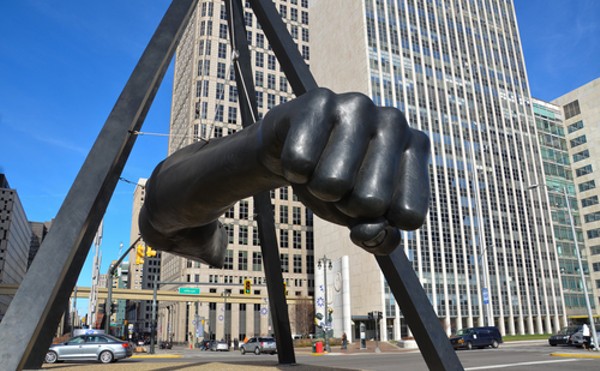"If it wasn't for her," Stove said, "this building would be infested with those fellas doing what they do, kicking in those doors." (The building's management company declined to comment when reached by MT.)
Not only was there a lack of tangible results — quite literally, nothing changed — but the raid also left an emotional scar on the residents the department claimed they were trying to protect. Everyone, it seemed, was treated as a suspect simply for living at Colony Arms.
"For them to come to my residence like that, like I'm the enemy. I was nervous, I was shaking," one resident said in The Periphery essay. "They didn't even have anything on me, but my whole body was shaking. I couldn't even talk right."
One hundred and fifty law enforcement officers went into the building with what amounted to a "blanket search warrant to tear apart" the place, said attorney Marvin Barnett, who represented the parolee convicted of carjacking who was arrested in the raid. "They started to search the place, going door by door, like it was a foreign country or something."
In that case, police found a gun that belonged to the man's mother, but his probation stipulated he couldn't be anywhere near firearms. Still, he walked free because on three separate occasions, a police witness present at the man's arrest failed to appear in court.
"The fact the police didn't show up, I'm not going to presume anything, but that's a bad sign," Barnett said. "Why wouldn't you show up to the court to defend the search warrant?"
Operation Restore Order has resulted in over 1,000 arrests, according to the department. The public's expectation, given those numbers, would likely be some sort of corresponding uptick in prosecutions.
That's not the case, however.
"Our office simply has not received an influx of cases from these raids," Wayne County Prosecutor Kym Worthy told MT. "We are awaiting the results of these raids in our office, in terms of warrants being brought there."
In the most recent raid on March 3 (Operation River Walk II), for example, the more than 200 officers involved made 24 felony arrests, 10 arrests for probation violations, and 13 for narcotics.
"We're not talking about misdemeanor theft suspects," Craig told reporters. "We're talking about people engaging in violent crime."
When reached by MT weeks later, Worthy's office couldn't identify a particular case that was brought as a result of those arrests.
LeValley said there's not a "hard number" on success, as it relates to the operation.
"So it's maybe a combination of a lot of those factors; so if we went out and arrested very few people, but our presence reduces crime in the area, that would mean we would consider it a success," he said. "If we went out and we apprehended a large number of people, who were wanted on outstanding warrants and brought them to the next step of the criminal justice system, we would consider that a success too, because we're responsible for those outstanding warrants.
"So it's hard to put an actual number to measure the success, but I think that overall continuing the reductions in violent crime and property crime that's one of our biggest measures of success."
If there's not a bevy of new charges, then, what Operation Restore Order has produced is a massive seizure operation.
To date, Detroit police have seized 339,213 grams of narcotics as a result of the raids. Ninety-nine percent of that total — 336,750 grams — is marijuana. (MT's analysis of statistics did not include DPD's broad category of "pills," of which nearly 6,000 have been seized since the inception of Operation Restore Order.)
Detroit residents overwhelmingly voted to decriminalize the drug in 2012, approving a measure that allows adults over 21 to possess up to an ounce on personal property without risking criminal prosecution. The state of Michigan also legalized medical marijuana in 2008.
Outside of weed, the department has impounded 1,064 vehicles, issued 15,497 tickets, and seized $215,389 in cash, and 175 weapons.
It's unknown what drives DPD's decision to seize property; the practice of asset seizures by police departments across the nation has been a subject of controversy in recent years. Last year, agencies across the state seized $24 million in property from Michigan residents, many of whom were never charged with a crime, a recent investigation by the Detroit Free Press found.
If the purpose of those figures is to illustrate the success of the operations, they fail to support that claim, and the numbers themselves are misleading otherwise.
Last month, Craig touted Operation Restore Order to reporters, saying 1,172 arrests had been made since its inception, including the apprehension of 18 homicide suspects.
But there's a discrepancy with those stats: Records sent to MT by the police department don't corroborate what Craig told news outlets, though a spokesperson emphasized that was indeed the case. The records show 1,881 arrests have been made, of which 21 were homicide suspects, as well as 72 being arrested for carrying a concealed weapon, 20 for criminal sexual conduct, and 46 for breaking and entering. Further requests for clarification were not returned.
And though media reports indicate the police department amassed those 1,172 arrests through 17 high-profile raids, that's also not true: The initiative and that arrest total are seemingly a compilation of every warrant that has been executed since November 2013, not just those from the raids.
"It is important to note that Operation Restore Order efforts also take place on a weekly basis, on a much smaller scale within each of our precincts," a DPD spokesperson told MT.
The essential operations division in each precinct designates a day where officers go out and "try to pick up people on outstanding warrants within the precinct," said LeValley. "And then once a month we designated we would have a large-scale operation where we would combine efforts, get everybody together in one location, have some outside agencies participate," he said, including Michigan State Police and the FBI's Detroit bureau.
High-profile operations (the ones familiar to the public) are given names depending on where they're located or the time of year. Those, LeValley said, have "a lot of narcotic raids associated with them in addition to the outstanding warrants."
"The whole idea of Restore Order was there would be a day a week designated that all of the crews would go make active attempts to apprehend people who were capias [an arrest warrant if you fail to show up for a court proceeding, or for the purpose of ensuring they appear in court], who didn't show up for court who were wanted on outstanding warrants in all of the precincts," LeValley said. "So you see weekly numbers, those are a compilation of all of the precincts send in their stats that they dedicate resources to Restore Order for that week."
To be clear, some residents in Detroit's neighborhoods and experts interviewed for this story believe Craig has delivered results, particularly by increasing police presence in the city. The sight of additional officers on patrol is unquestionably welcome.
And, in general, crime dropped citywide in 2014 under Craig's watch — but, so far, the first three months of 2015 has brought a 25 percent increase in homicides and a 6 percent increase in aggravate assaulted, compared to the same period last year. Still, LeValley noted that year-to-date compared to 2014, violent crime is down 4 percent, property crime down 19 percent, robberies down 22 percent, and carjackings down 27 percent.
But the long-term raid operation itself — touted as one of the police department's chief crime-fighting tactics — appears to have definitively produced very little other than some nice PR, an evidence locker stuffed with marijuana, positive headlines, a terrifying show for some residents, and some empty stats.
In the Detroit Police Department's overview of 2014, Operation Restore Order is described as "responsible for removing a large amount of weapons, narcotics, and violent criminals from city streets."
What the overview doesn't say outside of the arrest total, however, and what DPD doesn't appear to track, is how many "violent criminals" were put behind bars because of the raids.
MT requested the names of individuals who were arrested and the disposition of each arrest under Michigan's Freedom of Information Act. That request was denied by the city's legal department, which wrote, "In order to comply with your request, the DPD would have to compile, summarize, or make a new report."






